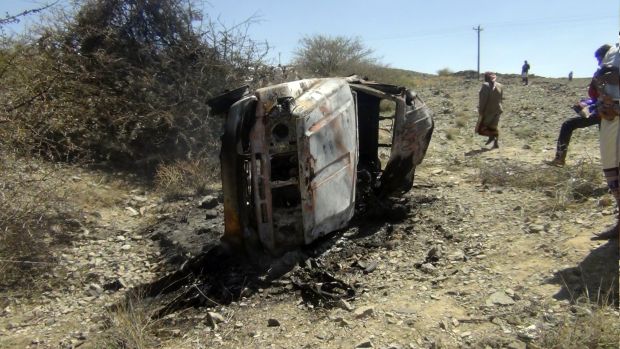
People gather near a destroyed car that was carrying militants in the Sawmaa area of Al-Bayda province, Yemen, on April 19, 2014. (AP Photo/Nasir Al-Sanna’a)
Sana’a and London, Asharq Al-Awsat and AP—A number of Yemeni security officials were assassinated on Monday and Tuesday, possibly in retaliation against a series of recent air strikes and drone attacks against Al-Qaeda targets in the south of the country.
Yemeni officials said three colonels in Yemen’s intelligence service and military police were killed in Sana’a on Monday and Tuesday by gunmen on motorcycles, while the deputy head of security in the city of Harib was shot dead by unidentified assailants on Tuesday.
Security sources said the killings resembled those carried out by militants previously linked to Al-Qaeda, who have targeted dozens of members of Yemen’s military and police in recent months.
The attacks came after Yemeni forces, reportedly backed by US drone strikes, hit Al-Qaeda militants for a second straight day on Monday, in what Yemeni officials said was an assault on a major base of the terror group hidden in the remote southern mountains, in Wadi Al-Khayala and two other locations, Lodiya and Ramtha.
The government said 55 militants were killed in that attack, including three notable militants identified as Mohammed Salem Abed Rabbo Al-Mashibi, Fawaz Hussein Al-Mahrak and Saleh Said Mahrak. It said identification of the remaining dead was continuing, and that non-Yemeni Arab fighters were among those killed.
The assault appeared to be a significant escalation in the US and Yemeni campaign against Al-Qaeda in the Arabian Peninsula (AQAP).
The United States has been heavily targeting AQAP in the country with drone strikes the past two years, trying to cripple the group after it was driven out of several southern Yemeni cities in 2011.
But the group has proven highly resilient, spreading around the country and working from mountain areas. In a show of the group’s boldness, a video recently posted on Islamic militant websites showed the group’s leader, Nasser Al-Wahishi, meeting openly with a gathering of dozens of militants in the southern province of Abyan.
Sunday’s strikes targeted what was described by Yemeni leaders as an AQAP training base. The Yemeni Interior Ministry said the attack lasted for several hours.
Also on Sunday, a security official said Yemeni anti-terrorist forces have targeted a vehicle suspected of carrying Al-Qaeda operatives in Shabwa. Shortly after, a helicopter arrived on the scene to pick up the bodies and those injured, local witnesses said, speaking on the condition of anonymity for fear of retribution.
In Washington, Pentagon and CIA spokesmen declined to comment on the attacks.
The escalation came after the return from the US of Yemeni Defense Minister Maj. Gen. Mohammed Nasser Ahmed and his commanders following a two-week visit.
Washington ramped up its fight against AQAP after it carried out a string of unsuccessful bomb plots targeting Americans, including an attempt to bring down a US-bound airliner with explosive hidden in the bomber’s underwear and a second plot to send mail bombs hidden in the toner cartridges on planes headed to the US.
The group’s fighters overran several towns and cities in southern Yemen in 2011, taking advantage of the political chaos amid a popular uprising against then-President Ali Abdullah Saleh, who was later driven from power.
A major 2012 government offensive, aided by the US and Saudi Arabia, drove out Al-Qaeda militants from southern towns they had taken control of during the security vacuum a year earlier, during a popular uprising against Yemen’s longtime leader, Ali Abdullah Saleh. The group has since remained largely mobile and used rugged mountain areas for cover, often with approval from some tribal leaders.
